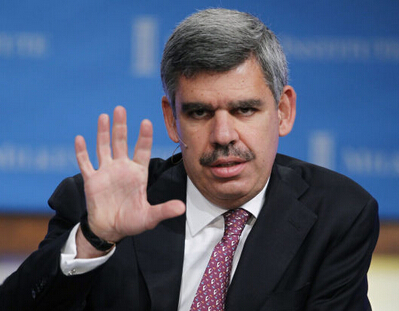Last week’s global sell-off, the worst since January,had all the features that make such market eventsboth frightening and exciting for investors. Itserves as a reminder to policy makers of the latentthreats to financial stability, and the implicationthis carries for growth and jobs. It also providesinsights for the more bumpy road that lies ahead.
最近一轮全球资产抛售是今年1月以来最为严重的,拥有既让投资者感到恐慌、又让他们感到兴奋的市场事件的所有特征。它让政策制定者感到了金融稳定的潜在威胁,以及这种威胁可能给经济增长和就业带来的影响。它还让人们看到,未来的道路更加崎岖不平。
The sell-off was sharp, sudden and generalised. In just a few days the downturn erased theyear-to-date gains for major US equity indices, with virtually every segment – both large andsmall – experiencing significant losses. To add insult to injury, conventional correlationsamong asset classes broke down as the spillover of the equity market correction spreadbeyond corporate credit. Commodities also sold off, as did the safest of all havens, Germanand US government bonds. Well-diversified asset allocations did little to mitigate portfoliorisks.
此次抛售是剧烈、突然和全面的。在短短几天时间里,美国主要股指的下跌就抹平了今年以来的涨幅,几乎所有板块(无论是大还是小)都出现了大幅下挫。雪上加霜的是,随着股市调整的溢出效应蔓延至企业信贷以外,不同资产类别的传统关联也被打破。大宗商品也遭到抛售,最安全的避险资产德国国债和美国国债同样如此。多样化投资无助于减轻投资组合风险。

Rather than being driven by a single factor, the correction reflected the cumulative impact ofmultiple causes that markets could no longer shrug off given high valuations and unbalancedinvestor positioning. They covered geopolitical, financial, economic and policy factors.
考虑到市场的高估值和投资者头寸失衡,此次调整反映出市场不再无视多种因素——而非仅仅受到单一因素的推动——累积的影响。这些因素涵盖地缘政治、金融、经济和政策几个方面。
Geopolitical tensions
地缘政治紧张局势
On the geopolitical front, markets could no longer ignore mounting tensions that riskdisrupting global growth, trade and energy. These include the escalating violence in Ukraine,along with the widening Moscow-west divide that it fuels; civilian deaths in Gaza, and the riskof future radicalisation; the deteriorating rule of law in Iraq and Libya; and the continuingfragmentation of Syria.
市场不再忽视日益加剧的地缘政治紧张局势,后者可能影响全球增长、贸易和能源。这些紧张局势包括乌克兰日益恶化的暴力冲突,再加上由此引发的莫斯科与西方分歧加剧;加沙平民死亡和未来极端化的风险;伊拉克和利比亚法治日益恶化,以及叙利亚持续分裂。
本文关键字: 解读新一轮全球范围内的资产抛售
 免费试听
免费试听

时长 : 29:45 主讲 : 乔迪

时长 : 44:09 主讲 : 徐宸

时长 : 21:15 主讲 : 徐宸

时长 : 21:15 主讲 : 徐宸

时长 : 44:09 主讲 : 徐宸

时长 : 29:45 主讲 : 乔迪

时长 : 15:31 主讲 : 徐新磊

时长 : 18:37 主讲 : 孔令金

时长 : 15:31 主讲 : 徐新磊
 推荐阅读
推荐阅读
第十三届全国人民代表大会第二次会议(the second session of the 13th National People& 39;s Congress)5日上午在人民大会堂开
第十三届全国人民代表大会第二次会议(the second session of the 13th National People& 39;s Congress)5日上午在人民大会堂开
第十三届全国人民代表大会第二次会议(the second session of the 13th National People& 39;s Congress)5日上午在人民大会堂开
第十三届全国人民代表大会第二次会议(the second session of the 13th National People& 39;s Congress)5日上午在人民大会堂开
第十三届全国人民代表大会第二次会议(the second session of the 13th National People& 39;s Congress)5日上午在人民大会堂开
第十三届全国人民代表大会第二次会议(the second session of the 13th National People& 39;s Congress)5日上午在人民大会堂开
第十三届全国人民代表大会第二次会议(the second session of the 13th National People& 39;s Congress)5日上午在人民大会堂开
第十三届全国人民代表大会第二次会议(the second session of the 13th National People& 39;s Congress)5日上午在人民大会堂开
第十三届全国人民代表大会第二次会议(the second session of the 13th National People& 39;s Congress)5日上午在人民大会堂开
第十三届全国人民代表大会第二次会议(the second session of the 13th National People& 39;s Congress)5日上午在人民大会堂开
